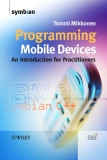Tài liệu Thư viện số
- Kỹ thuật cơ khí (1243 )
- Kỹ thuật xây dựng (1262 )
- Điện - Điện tử - Viễn thông (1456 )
- Công nghệ thông tin (1165 )
- CN Thực phẩm & Sinh học (1203 )
- Quản lý công nghiệp (748 )
- Khoa học cơ bản (1319 )
- Tài liệu tham khảo khác (622 )
Danh mục TaiLieu.VN
- Mẫu Slide Powerpoint
- Luận Văn - Báo Cáo (346704)
- Kinh Doanh Marketing (67778)
- Kinh Tế - Quản Lý (50036)
- Tài Chính - Ngân Hàng (57809)
- Công Nghệ Thông Tin (143292)
- Tiếng Anh - Ngoại Ngữ (47261)
- Kỹ Thuật - Công Nghệ (137309)
- Khoa Học Tự Nhiên (110530)
- Khoa Học Xã Hội (85272)
- Văn Hoá - Nghệ Thuật (54491)
- Y Tế - Sức Khoẻ (177214)
- Nông - Lâm - Ngư (63475)
- Kỹ Năng Mềm (29084)
- Biểu Mẫu - Văn Bản (27862)
- Giải Trí - Thư Giãn (52535)
- Văn Bản Luật (199483)
- Tài Liệu Phổ Thông (409665)
- Trắc Nghiệm Online (213578)
- Trắc Nghiệm MBTI
- Trắc Nghiệm Holland
Programming Mobile Devices: An Introduction for Practitioners
The importance of mobile systems programming has emerged over the recent years as a new domain in software development. The design of software that runs in a mobile device requires that developers combine the rules applicable in embedded environment; memory-awareness, limited performance, security, and limited resources with features that are needed in workstation environment; modifiability, run-time extensions, and rapid application development.
Programming Mobile Devices is a comprehensive, practical introduction to programming mobile systems. The book is a platform independent approach to programming mobile devices: it does not focus on specific technologies, and devices, instead it evaluates the component areas and issues that are common to all mobile software platforms. This text will enable the designer to programme mobile devices by mastering both hardware-aware and application-level software, as well as the main principles that guide their design.
Programming Mobile Devices:
Provides a complete and authoritative overview of programming mobile systems.
Discusses the major issues surrounding mobile systems programming; such as understanding of embedded systems and workstation programming.
Covers memory management, the concepts of applications, dynamically linked libraries, concurrency, handling local resources, networking and mobile devices as well as security features.
Uses generic examples from JavaTM and Symbian OS to illustrate the principles of mobile device programming.
Programming Mobile Devices is essential reading for graduate and advanced undergraduate students, academic and industrial researchers in the field as well as software developers, and programmers.
Programming Mobile Devices is a comprehensive, practical introduction to programming mobile systems. The book is a platform independent approach to programming mobile devices: it does not focus on specific technologies, and devices, instead it evaluates the component areas and issues that are common to all mobile software platforms. This text will enable the designer to programme mobile devices by mastering both hardware-aware and application-level software, as well as the main principles that guide their design.
Programming Mobile Devices:
Provides a complete and authoritative overview of programming mobile systems.
Discusses the major issues surrounding mobile systems programming; such as understanding of embedded systems and workstation programming.
Covers memory management, the concepts of applications, dynamically linked libraries, concurrency, handling local resources, networking and mobile devices as well as security features.
Uses generic examples from JavaTM and Symbian OS to illustrate the principles of mobile device programming.
Programming Mobile Devices is essential reading for graduate and advanced undergraduate students, academic and industrial researchers in the field as well as software developers, and programmers.
Từ khóa: mobile systems programming, software development, Programming Mobile Devices, workstation programming
247 p tailieu_dhtcct 10/03/2013 380 2


